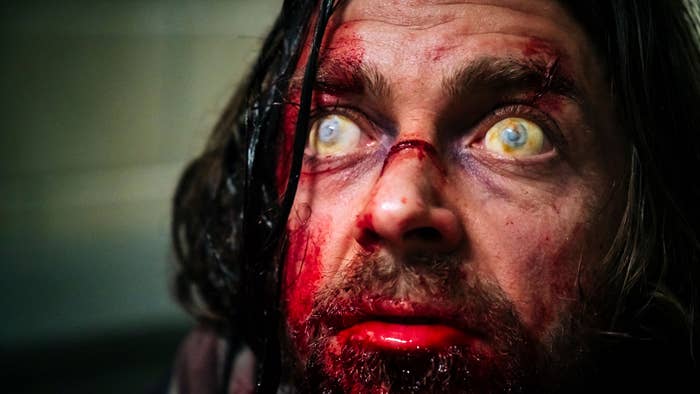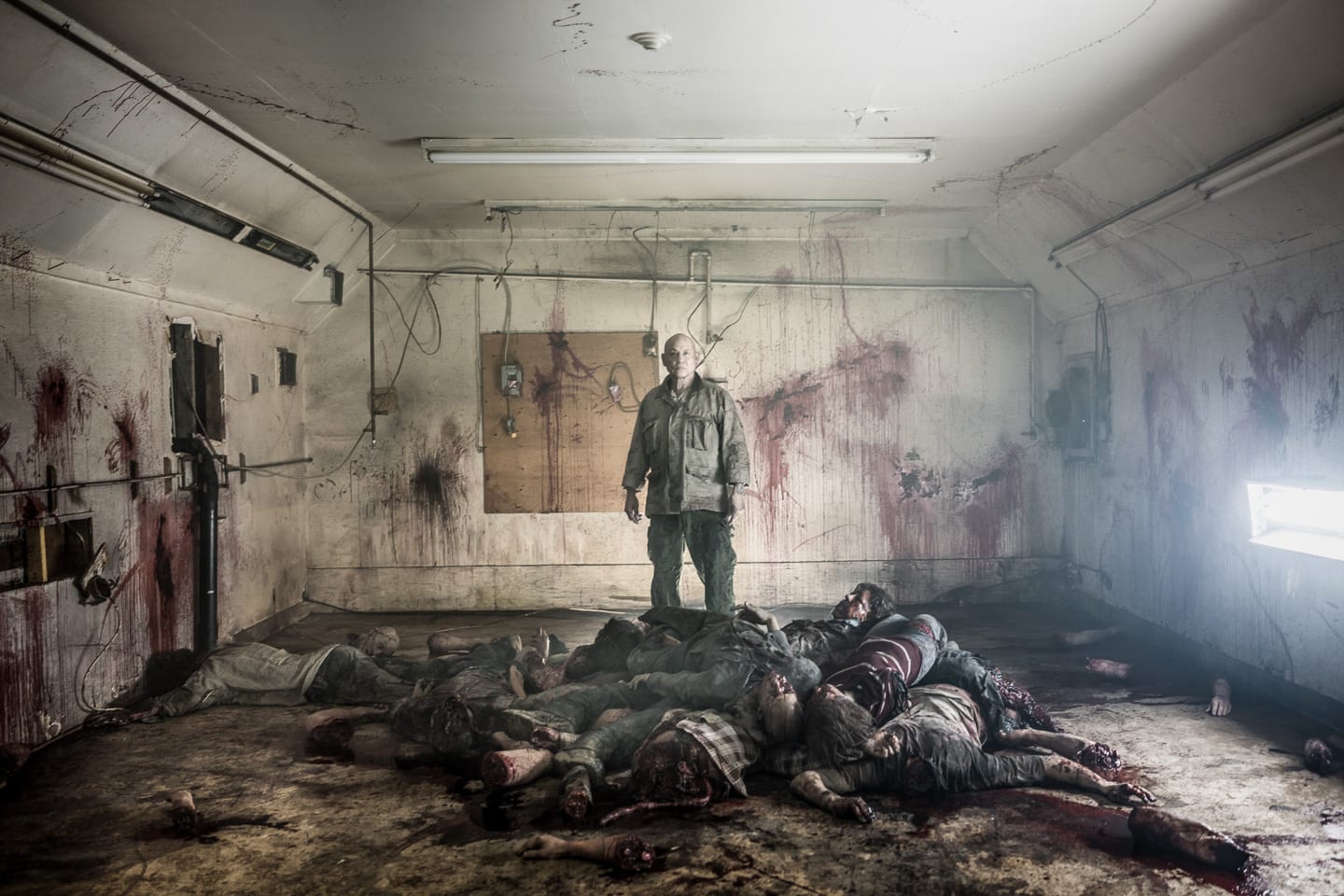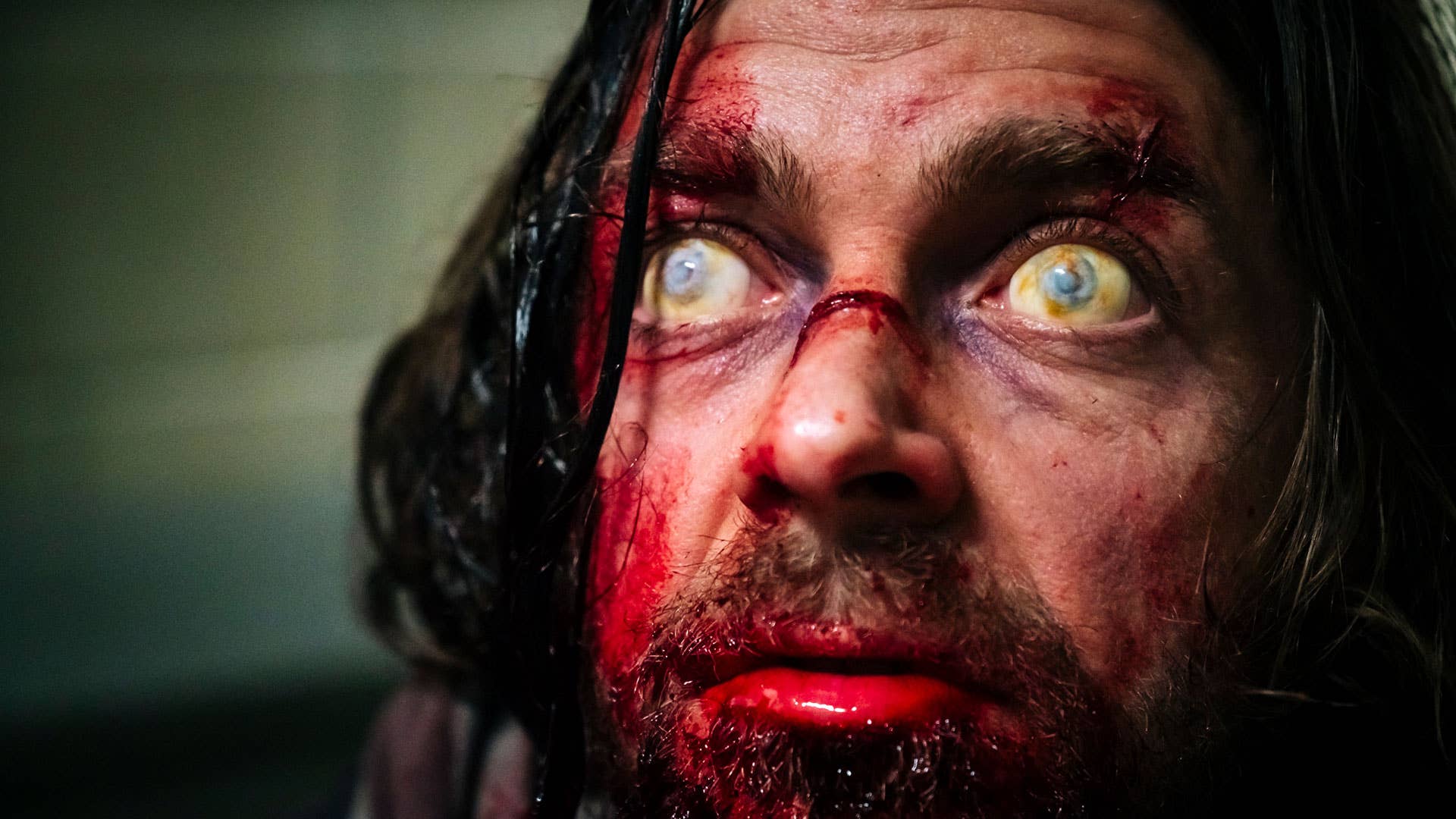
Jeff Barnaby’s Blood Quantum finds itself in the eye of the storm. This badass zombie flick from the Montreal-based Mi’kmaq director of 2013’s Rhymes for Young Ghouls is the movie of the moment. The unforeseen release of this film comes sandwiched between two seismic events—the Wet’suwet’en blockages and COVID-19 pandemic. These events capture the pulse of Blood Quantum’s zombie outbreak in which only the Mi’kmaq residents of Red Crow reserve are immune, while the title evokes a perverse settler-state system used to measure a person’s Indigenous heritage and ultimately restrict citizenship. It's ironically the perfect film for audiences with cabin fever consumed by anxiety-inducing news coverage of a pandemic ravaging the world. However, with its March 27 theatrical release postponed, and ultimately scrapped for a VOD release as the film industry adapts to a landscape without theatrical exhibition, Blood Quantum should have audiences ruminating on the metaphorical traits of its pandemic in between Tiger King binges and Contagion reruns.
Blood Quantum sees its Mi’kmaq characters survive the violence of settler ghouls by barricading themselves in a compound adorned with colourful graffiti à la Children of Men. (“If they’re white, they bite!” notes one spray-painted scrawl.) As stoic warrior Traylor (Michael Greyeyes), final-girl-figure Joss (Elle-Máijá Tailfeathers), and their son Joseph (Forrest Goodluck) hold strong with some machete and chainsaw-wielding members of their community, the dystopian atmosphere evokes the concerns for Indigenous sovereignty that were percolating in Canada earlier this year. But as the conversation about blockades, land rights, and heredity claims became lost in the rapidly changing news cycle of COVID-19 related chaos, Blood Quantum’s Wet’suwet’en resonance inadvertently speaks to the endless cycle of non-native Canadians taking note of Indigenous issues before being distracted by other stories. As with the events that Barnaby’s film evokes, like the 1981 raid on Restigouche reserve in a confrontation over fishing rights, history seems destined to repeat itself.
Speaking with us ahead of Blood Quantum’s release, Barnaby couldn’t help but note the ironic timing of the film’s release while unpacking some of the many movies, books, and cultural shifts that inspired it.
It’s been a while since Blood Quantum premiered at TIFF and you’ve had a chance to screen the film with audiences. How do you feel about the movie now that it’s being released?
I shield myself from the business side of things and the audience’s reception. I have a tendency to not pay attention to my films, or try not to anyway, after they get released. If you’re too invested in your films, that can really take its toll. It’s like having an ugly kid and not really acknowledging that the kid is ugly but everybody else does. I'm not so deluded that I can't see if my kid has a unibrow and a duck beak. The nature of the beast is that you have a tendency to look at the flaws.
How was it releasing a movie in this context?
It's crazy because of all the issues that are raised with the pandemic. I don't think the film would have been as well received in theaters. A virus exacerbated big issues, like disparity between the middle class and the rich. That doesn't play as well because anti-colonial is anti-capitalism. That message doesn't get across quite as distinctly as it would if it were released in theaters and treated like another popcorn zombie film.
The pandemic has raised many of those issues, especially in terms of people losing work and struggling to pay rent.
Because of the pandemic, you're forced to look at the issues. It extends beyond saying, “Look at the virus film and how we're in the middle of a virus.” The history of viruses and the history of colonialism are inextricably linked. The idea that a virus helped settle North America and create capitalism, and now it might be a virus that helps to undo it, I think is just completing the circle.
The question of returning to normal is going on through the film industry right now, like if you saw the reports about Trolls breaking the model and exhibitors responding against Universal.
There were already rumblings happening, anyway. You're seeing bigger viewership in places like Netflix versus the cinema. I think you're going to end up seeing some sort of pay-per-view model for theatrical releases, like you see in hotels. [The industry] is weighing how many more people are going to watch your film online versus how many people are going to be lost to group events [people watching the film together] versus single seller tickets. I think there’s a risk of losing those people in the middlel the ones who would have seen it in theater but don’t mind waiting until it comes out on VOD and don’t want to risk getting COVID-19 to sit in some dirty-ass theatre. I think much of the industry is just like the old guard that doesn't want to change and that what we see in theatres will be relegated to Avengers 18. It's going to be these safe bets.
Blood Quantum also joins a huge zombie outbreak in terms of culture. Zombies are everywhere and show no signs of letting up. Why do you think that is?
Most of this really exists in literature, not so much in films. I find zombie films have a tendency to regurgitate the same scenes. A couple of things stepped it up, like 28 Days Later. It introduced the fast zombie. It introduced the idea of the zombie outbreak being an infection, whereas before, films were vague. 28 Days Later spoke to this climate of fear around super bugs and a bigger picture beyond that—this idea of immigration. That film was ahead of its time.
"The history of viruses and the history of colonialism are inextricably linked."
What about The Walking Dead? That’s a phenomenon of its own.
I was more interested in literature than anything going on in film because, to me, that's stagnated. It's hard to reinvent the most popular television show because it's working for everyone. They're cranking out 22 episodes a year, which is bonkers. Why are you going to fuck with that formula? Zombies are slow. They're rotting. They shamble. They don't have any reasoning. They don't need to start talking. You see people try to mess with it, but the work gets a mixed reception, like The Girl with All the Gifts. A great example of something that should've been left alone was Word War Z. If you look at the book versus the movie, the book was a sociopolitical/cultural commentary on the times and then the filmmakers turned it into a generic fast zombie film. Even the films that we went through for inspiration, I don't think any of them were zombie films. The interesting gory-kill-stuff was in French Extreme horror.
What were some of the books that inspired you?
Stephen King's The Stand is really the only apocalypse book that I can think of off the top of my head. I've read that thoroughly over and over. That has protagonists who are immune to a virus. One specific protagonist is pregnant with a baby from a man who isn't immune. They debate throughout the book whether the baby will be immune. I think I got the idea [about Joseph having a baby with his settler girlfriend, Charlie] from The Stand and then it was a matter of turning that into an issue of race. When you're talking about native people, a viral outbreak is a no brainer because native people went through the exact opposite of that.

The film is also very topical coming out on the heels of the Wet’suwet’en protests and the blockades, and the discussion of Indigenous sovereignty that have arisen.
You hope that the conversation starts with the film. It’s a safe space because you're talking about a fictional world. Some beats in that fictional world are based in reality. Hopefully that bridge is the catalyst that starts the conversation. While we're talking about blockades, someone might see the film and think, “Hey, doesn't it remind me of the blockade from the Oka crisis or the incident at Restigouche? We [settler Canadians] have been doing this for the past 20 years.” Hopefully somebody then says, “Well it's been a little longer…” And then, BAM! You have bigger conversation because it’s a native film that deals with these issues. Nobody has any idea about their history, native people and non-native people.
How can Blood Quantum help audiences process the larger questions circulating around the film and in Canadian culture right now?
When I did Rhymes, none of the non-native people really knew what residential schools were. I'm doing Blood Quantum and now nobody knows what the blood quantum is. These are subtler concepts and you have to ask if people know who invented them. Everybody's running around to take credit for the iPhone, but residential schools and racial caste systems…nobody's taking credit for those! [Laughs.] It’s up to Canadians because they need to take a hard look at themselves and their history and realize that the system that empowers them is the same system that oppressed us. In order to find the equilibrium, people need to let go of that system. Everybody is having a hard time with that.
In terms of the cultural climate you see today, people are not really fighting over race, in my opinion. They're fighting over class. I think we're in a culture that's just sick of rich people and, you know, that population predominantly just so happens to be white—not always, but at least in the West. These are big ideas in a movie that has people getting their dicks bitten off, and dead babies. It's not going to solve racism, class warfare, or any of the things, but hopefully it creates a conversation where people can talk about these things like civilized adults, as opposed to online fuckwits that don't seem to know how to conduct themselves like human beings.

You mentioned Restigouche earlier. Was that the inspiration for setting the film in 1981?
It’s a deliberate call to history. And it's not ancient history—it went on in our generation. The film is timely, but there've been a lot of timely things before to act as catalysts. I grew up in the 1970s and ’80s and my “blockade event” was on my reserve, Restigouche. Then you flash forward and you get the Oka crisis [1990]. The movie isn't predictive. It's following cycles. It's the same with conflict over land. Individual people seem to get it, but the people in power do not. The movie’s talking about zombies, but it’s really about colonists.
The film has many big ideas and people have been throwing around the term like “elevated horror” recently for movies like Midsommar. Do you think that term is a cop-out? Should horror commentary embrace the badass qualities of the genre?
Oh, that's a total cop out. Like, these guys invented cerebral horror films? [Laughs] Has anybody seen Alien? The very nature of horror is to be cerebral. Like, that's not really an alien running around, it’s a penis. A train going into a tunnel isn't a train going into the tunnel, and that's been around forever. You could look at the Wolfman of the 1940s as a metaphor for puberty. I think you can identify a lot of ideas in the genre for quite a while.
I would even make the argument that Midsommar isn’t a horror film. You could say it's more of a cult film. I'd say that it's not either of those, but a film about relationships. It's a breakup movie. I don't look at any of these movies as “elevated horror” because that would say that the original Night of the Living Dead was only about dead people coming back to life and eating the living. That's a ridiculous statement. Cerebral, elevated horror has been around since the Lumière brothers. Horror has always spoken to higher concepts. Except the industry for whatever inextricable reason, has a tendency to look down on horror and animation too. The idea that people label me a horror filmmaker is an acknowledgement of the psychosomatics behind my energy.


